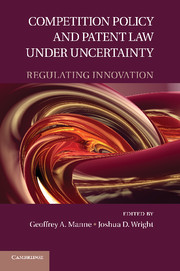Book contents
- Frontmatter
- Contents
- Contributors
- Introduction
- PART I THE INSTITUTIONS OF GROWTH
- 1 Legalize Freedom
- 2 What Is So Special About Intangible Property?
- PART II THE ECONOMICS OF INNOVATION
- PART III INNOVATION AND COMPETITION POLICY
- PART IV THE PATENT SYSTEM
- PART V PROPERTY RIGHTS AND THE THEORY OF PATENT LAW
- PART VI INTELLECTUAL PROPRETY AND ANTITRUST: THE REGULATION OF STANDARD-SETTING ORGANIZATIONS
- Index
- References
2 - What Is So Special About Intangible Property?
The Case for Intelligent Carryovers
Published online by Cambridge University Press: 05 June 2012
- Frontmatter
- Contents
- Contributors
- Introduction
- PART I THE INSTITUTIONS OF GROWTH
- 1 Legalize Freedom
- 2 What Is So Special About Intangible Property?
- PART II THE ECONOMICS OF INNOVATION
- PART III INNOVATION AND COMPETITION POLICY
- PART IV THE PATENT SYSTEM
- PART V PROPERTY RIGHTS AND THE THEORY OF PATENT LAW
- PART VI INTELLECTUAL PROPRETY AND ANTITRUST: THE REGULATION OF STANDARD-SETTING ORGANIZATIONS
- Index
- References
Summary
One of the major controversies in modern patent law is the extent to which property right conceptions developed in connection with land or other forms of tangible property can be carried over to different forms of property, such as rights in the spectrum or in patents and copyrights. This chapter defends the thesis that, once the differences in the optimal duration of patents and copyrights is taken into account, the carryover of basic property conceptions from tangible to intangible property should be much encouraged. In some instances, the property right concepts applicable to land work even better because some of the difficulties in designing a land based system disappear. The short life of patents, for example, obviates the need to create rules dealing with restraints on alienation over time. In addition, this chapter critiques the recent developments that limit the use of injunctions to protect exclusive rights of patent use, in eBay v. MercExchange. In a similar fashion, it notes that the limitations on rights of alienation in spectrum also create major social losses, as does the use of the patent exhaustion rule in the licensing of intellectual property, as applied by the Supreme Court in Quanta v. LG Electronics.
- Type
- Chapter
- Information
- Competition Policy and Patent Law under UncertaintyRegulating Innovation, pp. 42 - 74Publisher: Cambridge University PressPrint publication year: 2011
References
- 1
- Cited by



